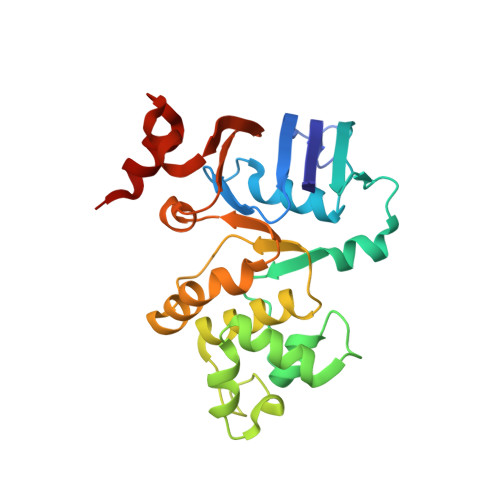Water-mediated protein-fluorophore interactions modulate the affinity of an ABC-ATPase/TNP-ADP complex
Oswald, C., Jenewein, S., Smits, S.H.J., Holland, I.B., Schmitt, L.(2008) J Struct Biol 162: 85-93
- PubMed: 18155559
- DOI: https://doi.org/10.1016/j.jsb.2007.11.006
- Primary Citation of Related Structures:
2PMK, 3B5J - PubMed Abstract:
TNP-modified nucleotides have been used extensively to study protein-nucleotide interactions. In the case of ABC-ATPases, application of these powerful tools has been greatly restricted due to the significantly higher affinity of the TNP-nucleotide for the corresponding ABC-ATPase in comparison to the non-modified nucleotides. To understand the molecular changes occurring upon binding of the TNP-nucleotide to an ABC-ATPase, we have determined the crystal structure of the TNP-ADP/HlyB-NBD complex at 1.6A resolution. Despite the higher affinity of TNP-ADP, no direct fluorophore-protein interactions were observed. Unexpectedly, only water-mediated interactions were detected between the TNP moiety and Tyr(477), that is engaged in pi-pi stacking with the adenine ring, as well as with two serine residues (Ser(504) and Ser(509)) of the Walker A motif. Interestingly, the side chains of these two serine residues adopt novel conformations that are not observed in the corresponding ADP structure. However, in the crystal structure of the S504A mutant, which binds TNP-ADP with similar affinity to the wild type enzyme, a novel TNP-water interaction compensates for the missing serine side chain. Since this water molecule is not present in the wild type enzyme, these results suggest that only water-mediated interactions provide a structural explanation for the increased affinity of TNP-nucleotides towards ABC-ATPases. However, our results also imply that in silico approaches such as docking or modeling cannot directly be applied to generate 'affinity-adopted' ADP- or ATP-analogs for ABC-ATPases.
Organizational Affiliation:
Institute of Biochemistry, Heinrich Heine University Duesseldorf, Universitaetsstr. 1, 40225 Duesseldorf, Germany.















